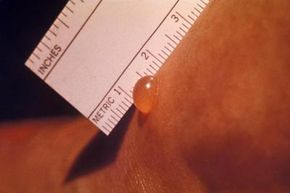Preventing Chigger Bites
Chiggers are almost invisible to the naked eye, so it may seem like there's not much you can do to keep from being bitten. But several simple steps can make it a lot less likely that you'll become a chigger host:
- Wear long sleeves and long pants made of tightly woven fabric. This will provide a physical barrier that can help keep chiggers off your body. It's also a good idea to tuck your pants into your boots so there's no exposed skin.
- Use an insect repellent. Many experts recommend repellents containing the chemical DEET. Others suggest using sulfur, although it can have a strong odor. Regardless of which repellent you choose, be sure to follow the instructions precisely. Some repellents can be used only on clothing or have to be reapplied after a certain amount of time. Never use flea collars to try to repel chiggers or any other pest -- the chemicals in flea collars can burn or irritate human skin.
- Stay on marked trails and away from tall weeds, brush and heavy undergrowth.
- Shower thoroughly after entering any areas that might be infested. Lather your body with soap several times, and rinse thoroughly. Since chiggers can wander around for hours, a prompt shower may wash them all away before they do any harm.
- Wash any clothing you've worn in chigger-infested areas in hot, soapy water. The hot water and soap will kill the chiggers, but they can survive cold- or warm-water washes.
You can also try to reduce the number of chiggers on your property. Sometimes, the only way people know they have an infestation is the appearance of fresh chigger bites. However, you can look for chiggers on your property using a 6-inch (15-centimeter) square piece of black paper or cardboard. Place the paper or cardboard on its edge in an area that you suspect contains chiggers. Any chiggers that are there will follow their instincts and climb to the top edge of the paper. Since chigger infestations tend to be localized, it's a good idea to repeat this test at multiple locations on your property and use an insecticide only on areas that are infested. Be sure to shower and wash your clothes afterward.
Advertisement
You can also reduce the number of chiggers in your yard by cleaning up potential chigger habitats. These include overgrown weeds, decaying wood and other vegetative debris. Keeping your lawn neatly mown will also help keep the chigger population down.
Related HowStuffWorks Articles
- How Ticks Work
- How Fleas Work
- How Bees Work
- How Snakes Work
- How Alligators Work
- How Mosquitoes Work
- How Spiders Work
- How Sharks Work
- How Whales Work
- How Dogs Work
- How Cicadas Work
- How Bats Work
- How Evolution Works
- How Allergies Work
- How do honeybees make honey?
- How can you train honeybees to sniff for bombs?
- What are chiggers and how do they bite?
- Chiggers: Medical Dictionary
- Scabies: Medical Dictionary
More Great Links
- Parasitology Research
- Parasite Picture Gallery
Sources
- Bicknese, Nina. "Chiggers!" MDC Online. (8/30/2007) http://mdc.mo.gov/nathis/arthopo/chiggers/
- Caplan, Larry. "Ticks and other Biting Insects." Purdue University. 5/29/2007 (8/30/2007) http://www.ces.purdue.edu/ces/Vanderburgh/horticulture/extnotes/2005/ticks.htm
- Finke, D.L. et al. "Chiggers." Maryland Cooperative Extension. (8/30/2007) http://www.hgic.umd.edu/_media/documents/hg79_000.pdf
- Hamman, Phillip J. "Chiggers." Texas Agricultural Extension Service. (8/30/2007) http://insects.tamu.edu/extension/bulletins/L-1223.html
- Jones, B.M. "The Sensory Physiology of the Harvest Mite Trombicula Autumnalis Shaw." University of Edinburgh. http://jeb.biologists.org/cgi/reprint/27/3/461.pdf
- Kansas State University. "Pests that Affect Human Health: Chiggers." (8/30/2007) http://www.oznet.ksu.edu/library/entml2/MF2107.PDF
- Koehler, P.G. and F. M. Oi. "Chiggers." University of Florida. (8/30/2007) http://edis.ifas.ufl.edu/IG085
- Lyon, William F. "Chiggers." Ohio State University. (8/30/2007) http://edis.ifas.ufl.edu/IG085
- New York City Department of Health and Mental Hygiene. "Chiggers." (8/30/2007) http://www.nyc.gov/html/doh/html/ehs/ehschig.shtml
- Ogg, Barb. "Itchy Chiggers!" UNL Extension in Lancaster County. (8/30/2007) http://lancaster.unl.edu/pest/resources/chiggers(008).shtml
- Parasitology Research. "Neotrombicula autumnalis." (8/30/2007) http://parasitology.informatik.uni-wuerzburg.de/login/n/h/0939.html
- Purdue University. "As Chiggers Get Thicker, It's No Time to Snicker, Says Entomologist." 7/16/2001 (8/30/2007) http://news.uns.purdue.edu/UNS/html3month/2001/010716.Gibb.chiggers.html
- Williams, Ralph E. "Chiggers and their Control." Purdue Department of Entomology. 6/2001 (8/30/2007) http://www.entm.purdue.edu/Entomology/ext/targets/e-series/EseriesPDF/E-34.pdf
